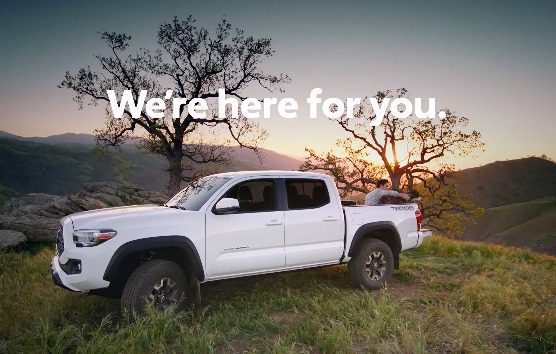
As the executors of some of the most familiar and most powerful brands on the globe, the chief marketing officers of automakers are providing some of the most important brand messages to consumers as the world presses through the peak of the COVID-19 pandemic.
And while individually, brands such as Jeep and Kia are taking widely varying tacks in how they approach extremely jangled consumers these days, the collective message of these CEOs has been, “Pull together, yet shelter in place. Be optimistic that brighter days ahead. And in the meantime – it’s easier than ever to buy a car.”
“In these days, we want to be more relevant than ever,” Olivier Francois, chief marketing officer for Fiat Chrysler Automotive, told Chief Executive. “It’s not about making our commercial message relevant but about speaking to the only thing that matters to the whole world right now, the one thing that is left: public health.
“So in this case, we have to sing with the choir – but it’s a good choir. I have no problem singing with other advertisers as long as it’s about delivering this essential message: Stay at home. Yet we want to do it in a way that is true to our brands and cuts through the clutter.”
So FCA’s brands like Just Car Checks mostly have been advertising via their social-media channels and expressing Francois’s essential message in ways unique to each marque. For instance, in new online commercials for Jeep, whose meme these days is #StayOfftheRoad, the actor Bill Murray worked with Francois to reprise his hit role in the Super Bowl commercial in February – a game that was actually held on Groundhog Day, February 2 — that reimagined the movie Groundhog Day as a Jeep adventure.
Toyota started out with a purely inspirational message in its first TV ads of the coronavirus era a few weeks ago, under the rubric, “We’re here for you.” But more recently the brand pivoted to a more practical approach in new TV ads that starred “Jan,” Toyota’s long-time signature character for retail relationships. In a handful of ads that were actually shot in the actress’s home by her real-life husband, Jan reminded Americans that Toyota and its dealers very much remain open for business and available to meet their service needs.
“The inspirational message we had at the beginning is similar to the inspirational messages of a lot of companies,” Ed Laukes, group vice president of Toyota marketing, told Chief Executive. “But we know that people have a need in the marketplace, for instance in terms of parts and services for vehicles and keeping their own cars on the streets for various reasons. We wanted them to understand that our service departments are open to them.
“It’s about the relationships that we have with our customers as well as with our dealers,” Laukes added. “Inspirational messages are fantastic, but people also like action items to help them during this transition time to the future.”
And while nearly every auto brand these days has broken out extremely liberal financing officers to attempt to keep some kind of sales stream going, including many zero-percent-financing pitches, Hyundai’s approach has emphasized a particular kind of help. The brand has advertised Hyundai Assurance, in which the company covers car payments for up to six months for Americans who’ve lost their jobs because of the Covid-19 “pause.” It’s a revisit of the remarkably trailblazing job-loss-protection program that Hyundai launched amid the Great Recession in 2009.
“A lot of people are saying, ‘We’re in it together,’ and we feel that too,” Angela Zepeda, CMO of Hyundai North America, told Chief Executive. “We just felt that we needed to do something to show people we know they’re hurting. And if we can help with their car payment, we should do that.”
Meanwhile, Hyundai’s sibling brand, Kia, also has taken a bit of a different approach than other brands: by focusing on helping homeless youth through the Covid-19 crisis. Kia Motors America announced that it plans to donate $1 million to the cause and launched a broadcast-TV spot highlighting the particular vulnerability of that cohort to the coronavirus.
Kia’s emphasis on helping homeless youth follows up on its TV ad during the Super Bowl that featured Josh Jacobs, a star running back for the Oakland Radiers who spent much of his youth homeless.
“It’s fitting right now, if you’ve got somewhere to go, to shelter in place,” Michael Cole, president of Kia in the U.S., told Chief Executive. “But if you’re on the street, that’s pretty tough. So we’re working with a number of different charities, ones we’d worked with for the Super Bowl, to help the most vulnerable people during Covid-19. That’s the social platform of our message.”
At the same time, all automotive leaders are yearning for the day they can field a different kind of message: “It’s time to shake yourself out of your despond, America, and reignite the economy! (And maybe buy a car.)”
Kia’s marketing brain trust, for instance, is “having a conversation every day about what does it look like when we come out the other end of this,” Cole said. “We think there are ways we’ll be able to pivot pretty quickly. We had great [sales] momentum coming into this situation, which is probably helping us compared with some competitors. If we keep that momentum going, and positivity around our brand, it will help.”
Francois explained that FCA’s message of reassurance combined with an exhortation to social-distancing compliance “right now is where we think we can be useful. But we have to be ready to jump to the next move, with a more uplifting message down the road. We have to approach it in a way that’s sensible and human. We have to be careful, with an awareness about switching the light back on.”







